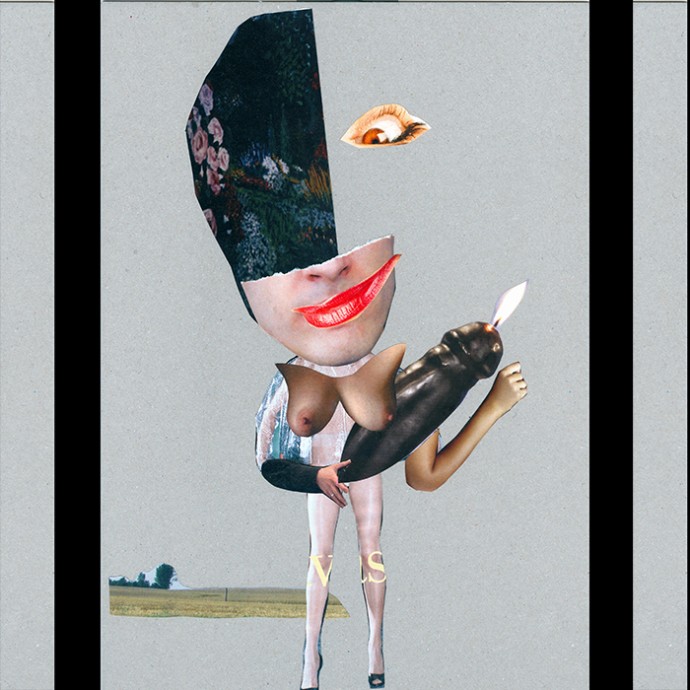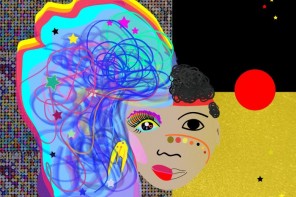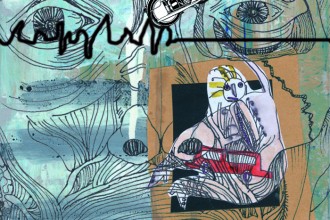You are asked to check off a box for ‘Male’ or ‘Female’. It happens so often that you don’t even think before answering—you just tick the appropriate one and move on without a second thought. At least, this is the case for cisgender people in Western society. For trans or intersex individuals, this seemingly routine choice becomes politically charged and intensely personal—what do you do when your gender identity doesn’t fit into a box?
Dr. Cary Costello, a sociology professor at the University of Wisconsin-Milwaukee, is trying to change the way society views trans and intersex people. Born intersex and raised female, Dr. Costello spent much of his life as a woman before transitioning to legal male status. He writes about the fluidity of gender and sex on his blogs, Trans Fusion and The Intersex Road Show. Cary talked to Sensa Nostra about the gender spectrum, what it really means to be intersex, and why you should stop asking trans people why they’re trans.
Being born intersex doesn’t have to be a difficult experience. It was difficult for me because Western societies have only two sex categories—male and female—and the fact that my body didn’t fit into either was viewed as a tragic medical problem. If I had been born into a society that had a special sex category for people with bodies like mine, one that expected people whose bodies transcended the binary to have transcendent spirits, I would have had a more positive experience. If I were, say, born in Indonesia among the Bugis people, who organize the gender spectrum into five categories, my experience would be very different—especially since the Bugis concept of bissu is both an intersex category and a valorized, shamanic one. Instead of being socially marginalized for having a ‘freakish’ body, I would be celebrated.
Most people are unaware of the scope of the Western medical attempt to erase visible intersex variations. They may have heard the terms ‘hermaphrodite’ or ‘intersex’, but they presume this must be a very rare thing, because that’s what our ideology of binary sex tells them. Since the sex binary is framed as natural, it makes sense to see intersexuality as a ‘birth defect’, and doctors altering our bodies as appropriate—even heroic. If they didn’t ‘treat’ us, people reason, we’d be doomed to live as freaks, mocked and harassed, probably lonely and partner-less. How would we know which bathroom to use, or which box to check—male or female—on everything from driver’s licenses and passports, to applications for schools and loans?
Despite public opinion, intersexuality is actually not that rare. In the U.S., at least 1 in 142 people is medically classified as having a ‘disorder of sex development’. Projecting this out onto the world population, we can estimate there are about fifty million people alive today whom doctors would classify as intersex.
Intersex people are all around you, but we’re rendered invisible by the ideology of the sex binary that doctors and legal systems enforce. This is the product of the Western system for categorizing sex. Many other societies have had additional sex categories to which they have assigned visibly intersex individuals. Sex is a spectrum, and societies have divided it up into different numbers of categories, just as they have divided the color spectrum into different numbers of named colors. The underlying natural reality remains a continuous rainbow of colors or bodies.
* * *
In Western society, where we understand people through the lens of dyadic gender difference, it’s not easy being a child born intersex, as both my wife and I were. For her, this meant infant surgery that assigned her male by removing her vaginal structure, dissecting her phalloclitoris from her perineum, and moving her urethral opening from the typical female position to the expected male one. This surgery left her with very little sensation in the phallus constructed for her—one which, if anyone had bothered to consult her, she wouldn’t have asked for, because it was clear by the time she was four or so that she identified as female. It is unclear how many intersex individuals, such as myself and my wife, do not identify with the binary sex we are assigned at birth. Doctors have not been eager to research this topic. But there seems to be a strong relationship between the extent of our surgical genital modification and the likelihood that we do not identify with the sex we are assigned at birth.
Most people with variant genitalia in the West share with my wife the experience of unconsented-to childhood surgery, but I was lucky in this regard. I was born with clitoromegaly (an enlarged clitoris) and two small vaginae, but my variations were more internal than external. I had an unusual bifid uterus and three gonads, including an ovotestis (a gonad between an ovary and a testis). My variance was visible, but it wasn’t that dramatic from an exterior view. When my mother asked the doctor about it as soon as I was born, he proclaimed me “just swollen from the birth” and sent me home. My medical interventions didn’t start until my teens, and I got to keep my capacity for sexual sensation. (I certainly didn’t emerge unscarred, though. I nearly died after contracting an antibiotic-resistant hospital infection during my penultimate intersex-related surgery, and was bedridden for months.)
For the past half-century or so, intersex children born in the West have been subjected to sex-assignment surgeries and other medical treatments intended to ‘normalize’ our bodies to binary ideals. There are many problems with these surgeries. There is the substantial risk of loss of capacity for sexual sensation that I’ve already mentioned. In addition, the removal of gonads is obviously sterilizing. The end results of such surgeries often involve scarred, atypical-looking genitalia, so our intersex bodies are not ‘normalized’ as promised. And, crucially, decisions about our bodies and our sex assignments are made without consulting us.
If a parent brought their infant to a doctor and said, “I wanted a daughter but got a son. Please perform a sex change on my baby,” that parent would be very poorly received. Gender transition is an intensely personal matter. Decisions about what medical alterations are made to our bodies, if any, should be left up to us. We should not perform these surgeries on unconsenting infants just because they are diagnosed with a ‘disorder of sex development’.
* * *
I believe that all humans are all born pansexual and gender-flexible, just as we are born able to learn to speak any language. But our polymorphous capacities are limited as we learn to speak our natal language, and to understand our gender and sexuality through the social categories used by our culture. Our societies classify us into a sex category, and we have to learn to identify with (or against) that particular classification system. The majority of us follow the norms. However, in settings in which people are given a socially-sanctioned way to change genders, there are always people who do. Now that we have a legal, medical route to gender transition in the West, even if it is still stigmatized, more and more people will take advantage of it.
As for the question of the origins of a trans gender identity or same-sex desire, people in the West tend to turn to essentialism. Scientists look for ‘gay genes’ or the ‘transgender hypothalamus’. Political advocates endlessly reiterate ‘born this way’ rhetoric, meaning to deflect bigoted claims that it is ‘unnatural’ to be LGBT. This further entrenches an ethnocentric belief that binary sex and sexual orientation are innate, rather than culturally specific. It makes it very hard for people to think outside these boxes. A cisgender identity needs just as much explanation as a transgender one, and a heterosexual identity as much explanation as a queer one. All of them are equally artificial, neither universal nor eternal.
When it comes to the relationship between being born intersex and gender identity, I believe that it varies. Genitals do not determine gender identity. If they did, there would be no trans people. The experience of intersex people further disproves the idea that ‘genitals determine gender’, because most Western people born genitally intermediate grow up to have binary gender identities. That said, the proportion of intersex people who do not identify with the sex they were assigned at birth is much higher than it is for non-intersex people. My belief is that this is because, from a young age, sex and gender are simply very salient for us.
If doctors are always examining your genitals critically, parents monitor your gendered behavior closely, your body doesn’t look like the ones in your schoolbook illustrations, and perhaps is scarred, in pain, or numb—then you’re likely to wonder if there is something ‘wrong’ with your sex. If you have any discomfort with your assigned gender, you’re more likely to understand that you are being forced into a box with which you do not identify.
* * *
This brings us to the ultimate question: why did I always feel uncomfortable in my assigned sex of female, even though I lived in it for many years, even though I tried to ignore that feeling and wished it would go away? Where did my male identity come from? This is a question, I must admit, that none of us can answer. And for this reason I always say that it’s a question that trans people should not be asked to focus upon.
Consider the history of discrimination against ‘homosexuals’. For decades, people sexually interested in the same sex were abused, marginalised, and psychoanalyzed to find the cause of their preferences. In the end, lesbian, gay, and bisexual people are winning the fight against discrimination because they stopped trying to find out why they were ‘deviant’, and focused instead on demanding to be treated with respect. ‘Born this way’ rhetoric isn’t really an ontological explanation. It’s a tool LGB people adopted to cut off inquiries into why they are queer, so they could move on from trying to answer the unanswerable. As an explanation, I find it essentialist and frustrating. But it is a useful tactic to shut down demands that we explain where our gender identities come from. None of us, cis or trans, really know.
It is a mystery. And I believe the mystery of the self should be cherished. I have had an intense fondness for documentaries since I was a small child, and have always enjoyed figuring out how things work. That, like the fact that I never felt comfortable or authentic living as a woman, is something for which I can name no source—and the origins of either should be understood as equally irrelevant to my being respected as I am.







